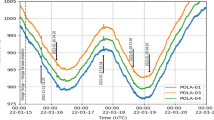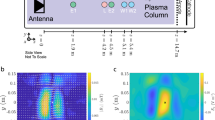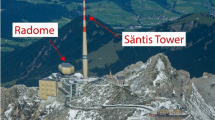Abstract
DURING the period March 1–April 6, 1960, the satellite Sputnik 3 passed over Britain at heights below 300 km., and on some sixty occasions the 20 Mc./s. signals were received at the Radio Research Station, Slough, when the satellite was close to or beyond the horizon, propagation being by ½-hop and 3/2-hop modes as has been reported for earlier satellites1. In the ½-hop mode the signal is reflected directly from the ionosphere to the receiving point, and, for the 3/2-hop mode, one ground reflexion precedes the ionospheric reflexion. Under these conditions, evidence has been obtained of strong focusing by the ionosphere of waves travelling along paths close to the skip-distance path.
This is a preview of subscription content, access via your institution
Access options
Subscribe to this journal
Receive 51 print issues and online access
$199.00 per year
only $3.90 per issue
Buy this article
- Purchase on Springer Link
- Instant access to full article PDF
Prices may be subject to local taxes which are calculated during checkout
Similar content being viewed by others
References
Bain, W. C., and Golton, E., Proc. First Int. Space Science Symp., Nice (1960).
Appleton, E. V., and Beynon, W. J. G., Proc. Phys. Soc., 59, 69 (1947).
Bremmer, H., “Terrestrial Radio Waves”, Chapter 8; also P.239 (Elsevier Pub. Co., Inc., 1949).
Author information
Authors and Affiliations
Rights and permissions
About this article
Cite this article
GOLTON, E. Skip-Distance Ray-focusing in the Ionosphere. Nature 189, 48–49 (1961). https://doi.org/10.1038/189048a0
Issue Date:
DOI: https://doi.org/10.1038/189048a0
Comments
By submitting a comment you agree to abide by our Terms and Community Guidelines. If you find something abusive or that does not comply with our terms or guidelines please flag it as inappropriate.



